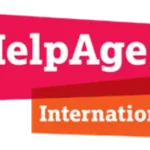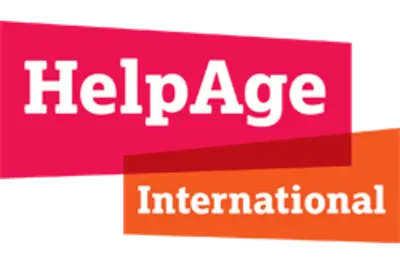
HelpAge International
HelpAge International works with partners and a diverse global network of more than 170 organisations over 90 countries, supporting millions of older people to live safe, dignified, and healthy lives. Through our partnership and collaborations, we work to ensure the inclusion of older people across society and strive to deliver a just and fair world for everyone, whatever their age.
HelpAge International has over the years been working with and for older people in emergencies. This includes the direct provision of humanitarian and recovery assistance and a leading role to promote the integration of ageing issues in policy and practice with the broader humanitarian community. In particular, the organisation has considerable experience in supporting humanitarian operations through the secondment of Age-Inclusion Specialists to field coordination mechanisms.
HelpAge and other research has consistently shown that failure to include older people in humanitarian response leaves them at serious risk of hunger, malnutrition, dehydration, exposure to the elements, illness, and even death. Humanitarian programs frequently use a blanket and centralized approach that does not include older people or respond to their differential needs. At the Humanitarian Coordination level, older people are largely invisible in Humanitarian Needs Overviews and Humanitarian Response Plans, which guide humanitarian response.
There are few efforts to solicit and incorporate older people’s views and expertise into the humanitarian program cycle. The lack of Age-Inclusive Specialists within the global humanitarian architecture and at the national level, as well as the lack of local NGOs with sufficient resources and expertise on the rights of older people at the country level, also hinder effective humanitarian protection for older people.
Research Focus: Türkiye
Türkiye is in the process of demographic transformation: the age structure of the population has changed with the decrease in fertility and mortality rates, developments in the field of health, increase in the standard of living, welfare level and life expectancy at birth. As of 2022, older persons (65+) constitute 9.9% of the population as of 2022, and the ratio is predicted to reach 11.0% in 2025, 12.9% in 2030, 16.3% in 2040, 22.6% in 2060 and 25.6% in 2080[1].
Türkiye hosts the largest refugee population in the world from different nationalities. Syrian refugees’ population is the largest in Türkiye with more than 3.2 million in which over 70,000 of them are over the age of 60[2].
Although in different proportions, all around the world older people experience deterioration in their social and economic situation, abuse and neglect, discrimination at work and/or daily life and no or under representation and participation. Displacement and disasters multiply the likelihood and damage of these risks for older persons. Research[3] indicates that older Syrian refugees, although they are physically capable to work, are excluded from the labor market which causes further isolation from the community. This also affects their ability to learn the Turkish language and engage with the community. They may also experience worsening health problems, that bring economic challenges and isolation. Although research on refugee population in Türkiye is available the data is only disaggregated by sex, and not by age. Therefore it is difficult to get a fully accurate picture of how many older refugees there are in the country, the specific barriers they encounter, their needs, and what type of services are available and accessible to them.
Purpose and Target Audience
The primary purpose of this research is to generate evidence that will be used to advocate to help ensure age inclusive humanitarian action in all humanitarian responses. More specifically the research will provide evidence about the tangible impacts of a dedicated Age Inclusion Specialist (AIS) working in the Age and Disability Inclusion Technical Team (ADITT) in Türkiye, over an eighteen-month period.
What is an ADITT?
ADITT, like other technical working groups within the Area Based Coordination mechanism (ABC) in Turkiye, can serve as crucial hubs of information, expertise, and coordination among humanitarian actors in a specific country context. The in-country AIS sitting in the ADITT is equipped to provide age-specific expertise and coordination among all agencies to ensure efficient and effective responses to the specific requirements of older people, particularly those at risk.
The role of Age Inclusion Specialists
The AIS takes a twin-track approach to promote age inclusive practices, provide technical guidance and expertise, and enhance coordination across sectors that are often siloed. The AIS coordinates to advance implementation of the GPC inclusion toolkit, lead local Sex, Age and Disability Disaggregated Data (SADDD) assessments and influence Humanitarian Response Overviews, Humanitarian Needs Assessments, and Area Based Coordination’s (ABC) updates to include robust information on older people. Among their priorities is to advance participation of older people in advocacy and consultation on humanitarian program implementation. HelpAge’s Global Humanitarian Age Inclusion Adviser within the HelpAge Global team provides strategic and technical support and training to the AIS. The AIS in Türkiye is already hired and is currently has an active role with the ADITT.
The research will provide an analysis of the impact of the dedicated Age Inclusion Specialist at different levels of the humanitarian system, highlight successes and activities and approaches to be replicated, as well as indicate where adjustments may be necessary.
The report will be targeted at the humanitarian community, including UN, I/NGOs, donors, civil society and government stakeholders working on the humanitarian response in Türkiye as well as the humanitarian sector worldwide. It will be disseminated online, through a public roundtable or webinar event, and through HelpAge’s networks of INGOs and humanitarian actors at all levels, including InterAction, ICVA, and at conferences and side events.
Main Research Questions
- What is the overall impact on inclusion of older people in humanitarian action of Age Inclusion Specialist working in country and within the national inter-sector coordination system?
- For example:
- Are stakeholders (government, INGOs, national and local NGOs, donors) more informed and acting for the benefit of older people?
- Have older people been trained to represent themselves in the ADITT?
- Are ADITT seen as an authoritative and reliable source for technical guidance on inclusion of older people and for coordination among stakeholders to advance inclusion?
- What contributes to the success of the Age Inclusion Specialist, such as specific activities, behaviours, professional relationships, contexts, etc.?
- What adjustments are needed to improve the impact of Age Inclusion Specialist?
Scope of Work
It is anticipated that the research plan would include the following elements:
- Identification of success metrics, in collaboration with HelpAge (see preliminary list below)
- A pre-post research method and analysis, including qualitative interviews with key informants (humanitarian actors involved in coordination and response, including relevant government officials, and older people impacted by the crisis). The pre phase would begin immediately after the research has been commissioned and the post phase would be conducted 18-20 months later.
- Development of case studies on the impact of the Age-Inclusion Specialist.
- Desk research including analysis of HelpAge documents.
Preliminary success metrics
- 50 humanitarian actors increase their awareness of the rights of older people and mainstream older people in their humanitarian response programming. This will be measured through a pre-post training survey. As a result, their increased awareness of aging issues will enable them to adapt their programming to include older people.
- 5 older people are trained and invited to represent the voice of older people in the ADITT.
- Country-level plans and processes include details about the rights of older people, such as the unique risks faced by older people, their specific needs and their capacities. As a result, country strategies and funding mechanisms will reflect the need for attention to the area of aging populations. In addition, needs assessments include data, which is disaggregated by sex, age (above 60- ideally in 5-year cohorts but minimally 10 year) and disability. As a result, older people will be made more visible and targeted for specific humanitarian actions.
Interested consultants and service providers are welcome to propose alternative or adjusted methodologies that meet the purpose and scope of the study.
Deliverables
- A written debrief on the baseline findings to provide insights into immediate adjustments that could be implemented.
- A written final report with an Executive Summary and detailed findings and implications and recommendations suitable for online dissemination and presentation at public events.
Time Requirement and Duration
The research is expected to commence in May 2024 and conclude with a final report for dissemination in December 2025.
Required Skills and Experience
Essential
- Primary degree(s) or equivalent professional experience in relevant field(s)
- Experience of working in humanitarian response/emergency contexts and dealing with national and international actors
- Knowledge and understanding of humanitarian policy, structures, systems and current debates.
- Demonstrable in-depth knowledge of ageing and needs of older people
- Strong writing skills in English with a clear, simple writing style
- Demonstrable experience in conducting similar studies
- Strong analytical and summarising skills
- Proven ability to work collaboratively as well as independently and in a way that encourages experimentation and brings new ideas
- Proven ability to generate credible and newsworthy research findings.
Desirable
- Experience of using research in advocacy and campaigns
- Knowledge of the Humanitarian Coordination System in Türkiye
- Working knowledge of Turkish language
- Ability and willingness to travel to Türkiye during the consultancy engagement
Safeguarding
HelpAge International is committed to safeguarding the communities with which we work, our partners, staff and any others who we come into contact with. Therefore you will also be responsible for:
- Preventing harm and abuse from our people, operations and programmes, to anyone that encounters our work;
- Reporting all safeguarding incidents you see, hear, hear about or suspect, using our internal reporting mechanism;
- Complying with all safeguarding framework policies and practices
- Completing mandatory training courses relating to our safeguarding policy framework and complying with HR vetting procedures.
Diversity & Inclusion
HelpAge International is dedicated to creating a diverse and inclusive environment for all its employees/consultants while extending the culture of inclusion into our work.
We believe that our workforce should reflect the wide diversity of the communities we serve, and that diverse voices should be elevated and intentionally integrated into our work. We embrace difference and diversity of identity, experience, and thought, and actively strive for inclusive behaviors across our sand work regardless of gender, race, disability, age, nationality, ethnic/national origin, sexual orientation, religious beliefs, marital status, pregnancy, social status, and political beliefs.
[1] TIHEK. 2022. Türkiye Yaşlı Hakları Raporu. p. 15
[2] Presidency Of Migretion Management. 2023. Geçici Koruma
[3] KORKMAZ YAYLAGÜL, Nilüfer; ASLAN, Melis. 2020. Yaşlılık, Mültecilik ve Sosyal Dışlanma: Suriyeli Yaşlı Mültecilerin Deneyimleri. Derdipark Cilt 29, Sayı 4
How to apply
Interested consultants are invited to submit an Expression of Interest (EOI) for delivery of the assignment and 1-2 examples of previous work to HelpAge HR [email protected] by Friday, 19 April 2024 with the email subject: ToR: Research on the Impact of Age-Inclusion Specialist in Türkiye.
The short EOI (3-4 pages) should include:
- A cover letter addressing the selection criteria above
- Proposed budget including any operational cost.
- CV
- Contact information for at least 2 professional references
Deadline: 19-Apr-24

